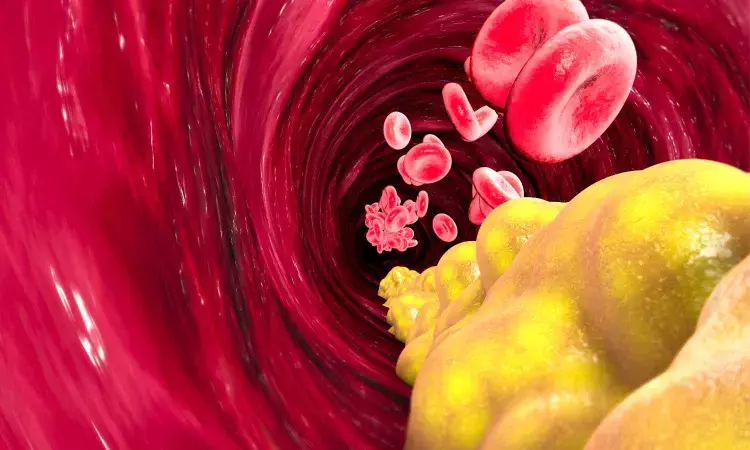- Home
- Medical news & Guidelines
- Anesthesiology
- Cardiology and CTVS
- Critical Care
- Dentistry
- Dermatology
- Diabetes and Endocrinology
- ENT
- Gastroenterology
- Medicine
- Nephrology
- Neurology
- Obstretics-Gynaecology
- Oncology
- Ophthalmology
- Orthopaedics
- Pediatrics-Neonatology
- Psychiatry
- Pulmonology
- Radiology
- Surgery
- Urology
- Laboratory Medicine
- Diet
- Nursing
- Paramedical
- Physiotherapy
- Health news
- Fact Check
- Bone Health Fact Check
- Brain Health Fact Check
- Cancer Related Fact Check
- Child Care Fact Check
- Dental and oral health fact check
- Diabetes and metabolic health fact check
- Diet and Nutrition Fact Check
- Eye and ENT Care Fact Check
- Fitness fact check
- Gut health fact check
- Heart health fact check
- Kidney health fact check
- Medical education fact check
- Men's health fact check
- Respiratory fact check
- Skin and hair care fact check
- Vaccine and Immunization fact check
- Women's health fact check
- AYUSH
- State News
- Andaman and Nicobar Islands
- Andhra Pradesh
- Arunachal Pradesh
- Assam
- Bihar
- Chandigarh
- Chattisgarh
- Dadra and Nagar Haveli
- Daman and Diu
- Delhi
- Goa
- Gujarat
- Haryana
- Himachal Pradesh
- Jammu & Kashmir
- Jharkhand
- Karnataka
- Kerala
- Ladakh
- Lakshadweep
- Madhya Pradesh
- Maharashtra
- Manipur
- Meghalaya
- Mizoram
- Nagaland
- Odisha
- Puducherry
- Punjab
- Rajasthan
- Sikkim
- Tamil Nadu
- Telangana
- Tripura
- Uttar Pradesh
- Uttrakhand
- West Bengal
- Medical Education
- Industry
Experimental drug Olezarsen may reduce hypertriglyceridemia in high-risk patients: NEJM

Hypertriglyceridemia, or high levels of lipids (fats) in the blood, increases the risk of heart attack, stroke and acute pancreatitis. Currently available medications, including statins, ezetimibe, fibrates and prescription omega 3 fatty acids, typically lower triglyceride levels by anywhere from below 10% to up to 40%. These therapies help, but they are not enough to prevent cardiovascular events in everyone.
An experimental treatment could further lower triglycerides in the blood, according to a placebo-controlled and double-blind trial led by researchers at Brigham and Women’s Hospital, a founding member of the Mass General Brigham healthcare system. Results were presented at the 2024 American College of Cardiology’s Annual Scientific Session & Expo and simultaneously published in the New England Journal of Medicine.
The trial randomized 154 adults on lipid-lowering therapy with moderate or severe hypertriglyceridemia to receive either 50mg olezarsen, 80mg olezarsen or placebo. Olezarsen is an antisense oligonucleotide that inhibits APOC3, a gene associated with higher levels of triglycerides, by targeting its mRNA. The subcutaneous medication was administered every four weeks, for a period of a year.
Olezarsen reduced triglyceride levels by 49% at the 50mg dose and 53% at the 80mg dose, compared with placebo. The experimental drug also reduced apolipoprotein B and non-HDL cholesterol, which are important in plaque formation, by 18 to 18.5% and 23% to 25%, respectively.
While larger and longer-term studies are needed to further assess the efficacy and safety of olezarsen in preventing heart attacks and strokes, the research opens up new avenues for improving the health of people with high cardiovascular risk. “These findings indicate that targeting APOC3 mRNA is a promising new pathway for lowering triglycerides and potentially reducing the risk of heart attack and stroke,” said corresponding author Brian Bergmark, MD, of the Division of Cardiovascular Medicine at Brigham and Women’s Hospital.
Reference:
Brian A. Bergmark, Nicholas A. Marston, ThoNew England Journal of Medicinemas A. Prohaska, Veronica J. Alexander, André Zimerman, Filipe A. Moura, Sabina A. Murphy, Olezarsen for Hypertriglyceridemia in Patients at High Cardiovascular Risk, New England Journal of Medicine, DOI: 10.1056/NEJMoa2402309.
Dr Kamal Kant Kohli-MBBS, DTCD- a chest specialist with more than 30 years of practice and a flair for writing clinical articles, Dr Kamal Kant Kohli joined Medical Dialogues as a Chief Editor of Medical News. Besides writing articles, as an editor, he proofreads and verifies all the medical content published on Medical Dialogues including those coming from journals, studies,medical conferences,guidelines etc. Email: drkohli@medicaldialogues.in. Contact no. 011-43720751


